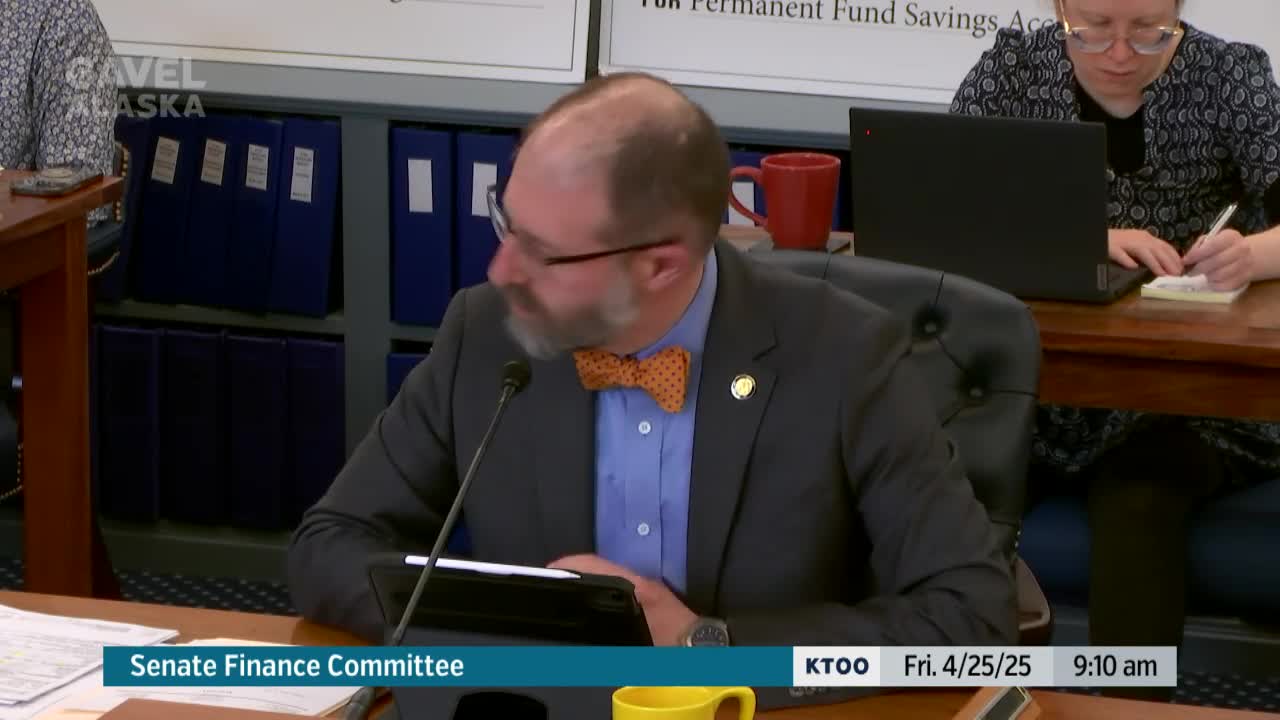Senate committee hears SB97 to create big‑game guide concession permits on state land
Get AI-powered insights, summaries, and transcripts
Subscribe
Summary
On April 25 in Juneau the Senate Finance Committee held a first hearing on Senate Bill 97, a proposal to create a state-run big‑game guide concession permit program intended to reduce hunter conflicts and support wildlife conservation. The bill is part of a package of "curative" measures tied to litigation over last year’s omnibus bill, SB189.
Juneau — The Alaska Senate Finance Committee on April 25 held the first hearing on Senate Bill 97, a proposal to establish a competitive concession permit program for big‑game guides on state land intended to reduce crowding and conflicts among guided, resident and subsistence hunters.
Senator Kathy Giesel, sponsor of SB97, told the committee the program would model federal concession areas: permits would be issued through an open, competitive process; they would be granted for a 10‑year term; and the measure would not limit resident or subsistence hunting. "The concession area, the permit area would be granted for a 10 year duration," Giesel said, describing the bill’s basic structure and fee authority.
The bill is being advanced as part of a set of curative bills responding to a lawsuit that challenges the single‑subject compliance of last session’s omnibus law SB189. Megan Wallace, chief counsel of Legislative Legal Services, told the committee the curative bills — including SB97 — were intended to give the legislature an option to "cure the alleged defect" if a court rules against the enactment of SB189.
SB97 would create a state permitting program administered by the Department of Natural Resources (DNR) with roles for the Board of Game, the Department of Fish and Game and the Big Game Commercial Services Board. Key provisions described to the committee include an initial pilot area (one game unit), a competitive process for awarding permits, a limit of three concession permits per guide, limited transferability, and enforcement authority.
Supporters at the hearing said the program would protect subsistence access and help manage overuse in problem areas. Jeffrey Toye, staff attorney for AFN (Alaska Federation of Natives), testified: "AFN supports this bill," saying it could "reduce conflicts over resources, preserve and protect subsistence rights for rural residents of Alaska, and promote equitable opportunities for Alaska Native guides and businesses."
Opponents and critics raised finance and legal concerns. Mark Richards, executive director of Resident Hunters of Alaska, testified: "We strongly oppose SB 97 as currently written," arguing the fiscal note understates long‑term costs, that the bill could create a new bureaucracy, and that limited geographic rollout could displace guides into other overcrowded areas. Richards also warned of potential constitutional exposure, citing a 1988 Alaska Supreme Court decision (referred to in testimony as the Osageck decision) and saying transfer provisions risk treating concessions as alienable property.
Sam Rohrer, president of the Alaska Professional Hunters Association, spoke for guides who support the concept, arguing the permits would be limited in duration and awarded on operational and conservation criteria rather than solely on monetary bids. "Reestablishing state concessions on state lands in Alaska has been the hunting guides' top priority for the last 36 years," Rohrer said.
Committee members reviewed three fiscal notes offered with the bill. Senator Kiehl summarized the submissions: a Department of Fish and Game Division of Wildlife Conservation fiscal note showing $112,000.3 in unrestricted general funds and one full‑time position; a Board of Fisheries and Game component showing $14,000.4; and a Department of Natural Resources Division of Mining, Land and Water note showing $341.6 and two full‑time positions, with indeterminate revenues from permit fees. Committee members asked whether the program could be made self‑sustaining through fees; the sponsor and witnesses said the applicable board historically seeks fee structures to cover program costs but could not provide a definitive guarantee at the hearing.
Legal questions about transferability and whether concession rights could be treated as private property were raised by committee members and public testimony. The committee asked Legislative Legal Services for additional briefing on those points before the next hearing.
No action was taken to advance or amend SB97 at this first hearing; the committee "set the bill aside" pending further information and follow up on the legal and fiscal questions raised.
The committee recorded that Senators present included the chair; Senators Stedman, Kiehl, Merrick, Kaufman, Crompton and Hoffman were on the committee for the hearing, and staff from DNR and Fish and Game participated by phone or at the table.
